
THE WORLD TO COME – The Artists
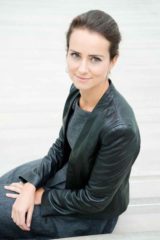
BIRKE J. BERTELSMEIER
»We know nothing of the world to come. Everything is open; many things are shapeable; others are set in stone. Some things we will still experience, but most things we will not, and so actually – if we were purely selfish – we could say it doesn’t matter. But we do care about the world. It makes a difference how we pass through it, and how we envision and imagine the future world in the present. So maybe we should try to look ahead positively. Let’s start with a »Gloria«, the hymn that has always been more of a song for the community than one for particular singers – and let’s stick with it until it becomes absurd. This »Gloria« is followed covertly by the other movements of Beethoven’s mass. And just as God is traditionally made present in the mass, Beethoven’s »Missa solemnis« is always subliminally present in THE WORLD TO COME.«
Birke J. Bertelsmeier is one of the most acclaimed composers of the younger generation. She studied composition with Wolfgang Rihm in Karlsruhe and Manfred Trojahn in Düsseldorf, and piano at the Hochschule für Musik und Tanz (University of Music and Dance), Cologne. As the winner of numerous composition competitions and a multiple scholarship holder – from various foundations – she has also received instruction from composers such as Brian Ferneyhough, Marco Stroppa, Beat Furrer, Hanspeter Kyburz, Olga Neuwirth and Adriana Hölszky.
Birke J. Bertelsmeier's work includes oratorios, opera projects, solo and orchestral works, and chamber music. In 2018 the quintet »Al di là« was formed following a commission from the festival Ultraschall. Together with Tilman Hecker she realized “Querelle” at the Tischlerei of the Deutsche Oper. She has collaborated with the Bamberg Symphony Orchestra, members of the Berlin Philharmonic, the Ensemble Modern and the Ensemble of the Deutsche Oper Berlin.
In addition to her own contribution, Birke J. Bertelsmeier is responsible for the overall score of THE WORLD TO COME.
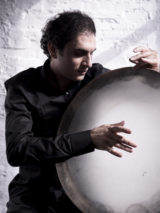
MOHAMMAD REZA MORTAZAVI
»The »Missa solemnis« is an emotionally powerful piece. It has intense, dark phases and moments of liberation. I drew from the »Credo«. While playing along on the tombak and daf, I noticed that although I play with the same feeling and I’m aware of a strong emotional connection to the piece, I set completely different emphases. So, I started to change the rhythm and accentuation, but basically, I left the harmonies of the piece as they were. This creates a fresh overall atmosphere. Because if you change one part, then you inevitably change the whole constellation. You have to go along with what’s happening and believe in what you are doing. Because true faith has nothing to do with religion, nothing to do with fear. True faith is trust.«
Mohammad Reza Mortazavi was born in 1979 in Isfahan, two months after the revolution in Iran. He has been living in Germany as a musician and composer for 19 years. He started playing the Tombak at the age of six and the Daf at fourteen. As a youth he often played in orchestras and won the national Tombak competition in Tehran six times in a row. He was fascinated by the multifaceted sounds of both instruments and went beyond their usual playing styles. The audience was enthusiastic about his musical ideas. Because of this resonance he decided to play a Tombak solo concert with his own compositions in Tehran. Despite the awards he received, the conservative official found his application ridiculous and rejected it: Solo performances for Tombak were only intended for the old masters – so the reasoning. Finally, he decided to move to Munich at the end of 2001 and turn his back on his previous success as a musician in Iran.
In order to point out a universal dimension of music, to which everyone can find an emotional connection, he emphasizes again and again that he does not see himself as a creator of music, but rather goes through it. If music finds a clear form of expression, it works for him like a spinning top, which at the moment of highest speed leads to a state of rest. His playing techniques appear here like tonal mirrors of the imagination. From today's perspective, Mortazavi describes finding a balance between concentration and letting go as the core element of his musical work: a constantly changing movement in which the boundaries of body and mind dissolve into one another. In this, a new and free music finally expresses itself as a philosophical position, which is perceived consciously or unconsciously.
For THE WORLD TO COME Mohammad Reza Mortazavi has collaborated with Lea Fink for the arrangement.
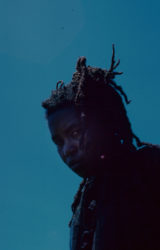
MOOR MOTHER
»It is important to me to analyse what has been acknowledged as history and what is known as historic sounds. I am not necessarily a fan of Beethoven. I am more of a researcher who wants to investigate the histories and the pillars of sound in history to stretch the conversation. I want to dissect those histories and break down those pillars.«
Moor Mother (Camae Ayewa) is a musician, poet, visual artist and activist. In 2016 her debut album »Fetish Bones« was released by Don Giovanni Records. Magazines like The Wire, Jazz Right Now and Rolling Stone praised the album as one of the best of the year. Shortly afterwards, her second album »The Motionless Present« followed, and at the end of 2019 her third album, »Analog Fluids of Sonic Black Holes«.
In recent years, Moor Mother has been a guest at numerous festivals, museums, galleries and universities. She has shared the stage with theoreticians, writers and artists such as bell hooks, Roscoe Mitchell, King Britt and Claudia Rankine. She also has a working relationship with the legendary Art Ensemble of Chicago. She is regularly involved in collaborations – her most recent publication, for example, was produced together with flautist and composer Nicole Mitchell. She is also participating in the projects Irreversible Entanglements, Moor Jewelry and 700 Bliss. Together with the artist, activist and writer Rasheedah Phillips, she forms the multidisciplinary collective Black Quantum Futurism, which works on new temporal models on the basis of Afro-Futurism.
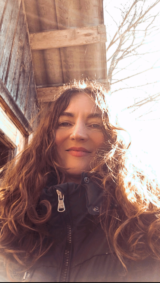
PLANNINGTOROCK
»Let your deafness no longer be a secret – even in art.«
»Beethoven was an artist with a disability and this brilliant notation above was found written on one of his compositions. My sister Beulah is autistic and even though she isn’t a composer, music has played and continues to play an important role in her life and especially as a disabled person. It has been amazing to learn more about how Beethoven navigated his deafness and how he lived it out through his music. I wrote a piece entitled »I hear you« for THE WORLD TO COME in honour to the power that music has to give us a life and a musical home beyond our bodies and social surroundings.«
Since their debut album »Have It All« in 2006, Planningtorock (Jam Rostron) who identifies as non binary have created queer club and pop music characterized by a personal and explicit political stance with clear and personal messages. Songs like »Patriarchy Over & Out« or »Let's Talk About Gender Baby« expand questions of gender politics into concise and meaningful slogans.
On their four studio albums – »Have It All» followed by »W« (2011), »All Love's Legal« (2013) and »Powerhouse« (2018) – Planningtorock combines rhythmic elements of club music together with pop synthesizers, classical elements and catchy queer pop melodies. In addition to their studio albums, they have collaborated with many other artists and created music for films, operas and fashion shows, e.g. for Chanel.
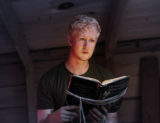
COLIN SELF
»Venturing into »Missa solemnis« was like wandering through an alien forest for me. After a while, I began to realize that one of the potential ways to interface with this work was to begin to decompose the compositions, looping and mutating them into new forms, inviting in themes that are left out of the solemn mass. I began to incorporate Polari, a criminal queer language from the UK that disguises itself as nonsense: »Deary gajo, do a turn on the nanna catever days! Sharda the charpering omee, we bona barney, nada dally, give a ferricadooza!« I think we must invite the language of criminal queers to replace biblical rhetoric, and prioritize silliness, messiness, and wildness over the symbolic canonical language of »Missa solemnis«. In ecstasy, may we mutate the legacy and property of Beethoven’s music toward a world where the icons of the catholic heteropatriarchy are long forgotten. Maybe this way, Beethoven could become mulch and a fertile soil for THE WORLD TO COME (if we are lucky enough to live to see it!).«
Colin Self is an artist, composer and choreographer based in New York and Berlin. He creates music and performance pieces designed to trouble binaries and play with the boundaries of perception. Self works with a broad range of communities using voices, bodies, and computers as tools to interface with biological and technological software.
Self is a teacher at NYU’s Clive Davis Institute in Berlin, and has presented work at The Dutch National Opera, HAU Berlin, The New Museum, The Kitchen NYC and Issue Project Room, among many international festivals and venues. He is a co-founder of the NYC queer performance collective Chez Deep and The Radical Diva Grant. Self also works closely with Holly Herndon and has performed with her touring ensemble since 2015. He runs XOIR, an international non-utilitarian vocal workshop focused on alternative modalities of group singing, and releases solo music on the record label RVNG Intl.
For THE WORLD TO COME, Self is collaborating with Justin Wong for the arrangement.
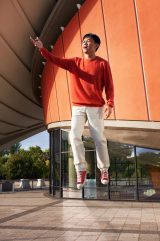
-
Thu 19:00Oct 8th
2020you missed it -
Thu 19:15Oct 8th
2020you missed it -
Thu 19:30Oct 8th
2020you missed it -
Thu 21:15Oct 8th
2020you missed it -
Thu 21:30Oct 8th
2020you missed it -
Fri 19:00Oct 9th
2020you missed it -
Fri 19:15Oct 9th
2020you missed it -
Fri 19:30Oct 9th
2020you missed it -
Fri 21:15Oct 9th
2020you missed it -
Fri 21:30Oct 9th
2020you missed it

